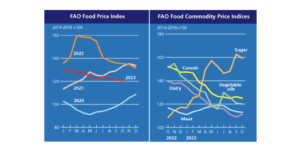As a result of the attack on Iran, nitrogen fertilizer at the port of New Orleans has seen an increase in price this week. Urea prices for barges in New…
Global Food Prices Continue to Drop- At Slower Pace
Reuters writer Nigel Hunt reported on Friday that, “The United Nations food agency’s world price index fell in October to its lowest level in more than two years, driven by declines in sugar, cereals, vegetable oils and meat.

“The Food and Agriculture Organization’s price index, which tracks the most globally traded food commodities, averaged 120.6 points in October, down from 121.3 for the previous month, the agency said in a report on Friday.
“The October reading was the lowest since March 2021.”
CHART OF THE DAY: Despite worries about the imapct of El Niño and the Russia-Ukraine war, global food prices continue to drop. The monthly FAO food price index, released earlier today, is at a 2½-year low | #OATT pic.twitter.com/9XEvE2PG5h
— Javier Blas (@JavierBlas) November 3, 2023
The article pointed out that, “The FAO Cereal Price Index averaged 125.0 points, down 1.3 points from September.
‘International wheat prices fell by 1.9% in October, reflecting generally higher-than-earlier-anticipated supplies in the United States of America and strong competition among exporters,’ the FAO said.
“In a separate report on cereal supply and demand, the FAO maintained its forecast for world cereal production this year at 2.819 billion metric tons, up 0.9% from the previous year,” the article said.
Also Friday, Dow Jones writer Yusuf Khan reported that, “Prices now stand about 11% lower than where they were a year ago, with the trend of falling food prices continuing, the FAO said Friday.
“In particular, the FAO said that cereal prices fell 1% from September, putting prices 18% lower than a year ago. Higher exports of wheat from the U.S. helped to lower prices, as did lower demand for rice, the Rome-based body said.”
Nonetheless, Patricia Cohen reported in Friday’s New York Times that, “Fears that Israel’s expanding military operations in Gaza could escalate into a regional conflict are clouding the global economy’s outlook, threatening to dampen growth and reignite a rise in energy and food prices.”
The Times article pointed out that, “‘This is the first time that we’ve had two energy shocks at the same time,’ said Indermit Gill, chief economist at the World Bank, referring to the impact of the wars in Ukraine and the Middle East on oil and gas prices.
“Those price increases not only chip away at the buying power of families and companies but also push up the cost of food production, adding to high levels of food insecurity, particularly in developing countries like Egypt, Pakistan and Sri Lanka.”





